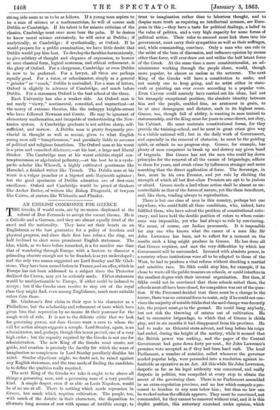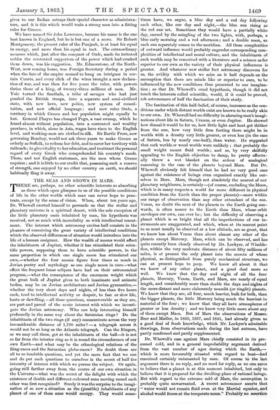AN ENGLISH COMMONER FOR GREECE.
THE Greeks, if would seem, are by no means displeased at the refusal of Don Fernando to accept the vacant throne. He is a Catholic and a German, and they are almost equally tired of the creed and the nationality. They have set their hearts on an Englishman as the best guarantee for a policy of freedom and physical progress, and since their first love refuses the ring, are half inclined to elect some prominent English statesman. The idea, which, as we have before remarked, is a far manlier one than that of wandering through Europe with a lantern to discover a princeling obscure enough not to be dreaded, is as yet undeveloped ; and the only two names suggested are Lord Stanley and Mr. Glad- stone. They have been named before in France, and an offer, which in Europe has not been addressed to a subject since the Protector declined the Crown, may yet be seriously made. Either statesman would be unobjectionable to Europe, if either could be induced to accept ; but if the Greeks once resolve to step out of the royal class they might find, even among Englishmen, much more suitable rulers than these.
Mr. Gladstone's first claim in their eyes is his character as a Philhellene, but the scholarship and refinement of taste which have given him that reputation by no means fit their possessor for the rough work of rule. It is not to the delicate critic that we look for governing power, nor does Greece want a man to whom the call for action always suggests a scruple. Lord Stanley, again, is an administrator, and, perhaps, though this is not proved, one of a very high order ; but the capacity required by the Greeks is not one for administration. The new King of the Greeks must create, not guide, and creation is precisely the faculty for which the want of imagination so conspicuous in Lord Stanley peculiarly disables his mind. Similar objections might, we doubt not, be raised against any English statesman, and the true mode of finding the candidate is to define the qualities really required.
The next King of the Greeks we take it ought to be above all things a governing man, and a governing man of a very peculiar kind. A simple despot, even if as able as Louis Napoleon, would be of no use at all. There is nothing which needs repression in Greece, but much which requires cultivation. The people, too, with much of the Asiatic in their characters, the disposition to alternate long seasons of rest with spasms of terrible energy, to trust to imagination rather than to laborious thought, and to despise mere truth as requiring no intellectual acumen, are Euro- pean in this ;—they have a taste for political dealings, a belief in the value of politics, and a very high capacity for some forms of political action. Their ruler to succeed must link them into his government, must carry their sympathies as well as their suffrages, and, while commanding, convince. Only a man who can rule in the midst of the buzz of discussion, and influence opinion by means other than force, will ever draw out and utilize the half latent force of the Greek. At the same time a mere constitutionalist, an ad- ministrator working through the people alone, would, though more popular, be almost as useless as the autocrat. The next King of the Greeks will have a constitution to make, and not merely one to keep going, and no artist either in state- craft or painting can ever create according to a popular vote. Even Cavour could scarcely have carried out his ideas, had not his strangely exceptional position, the absolute identity between him and the people, enabled him, an aristocrat in grain, to be at once demagogue and dictator, each in its highest sense. Greece, too, though full of ability, is wanting in men trained to statesmanship, and the King must for years to come direct, not obey, his Cabinet. He must maintain constitutional forms, for they provide the training-school, and he must in great crises give way to a visible national will; but in the daily work of Government, and especially in the removal of obstacles, he must be the guiding spirit, or submit to see progress stop. Greece, for example, has plenty of men competent to break up and destroy any given band of brigands. But Greece has not the men who could lay down principles for the removal of all the causes of brigandage, adhere to them for years, and crush crime by influences stronger and more searching than the direct application of force. The Sovereign, in fact, must be his own Premier, and yet rule by eliciting the strength of which all but first-class Premiers are apt to be jealous or afraid. Greece needs a lord whose action shall be almost as un- controllable as that of the forces of nature, yet like them beneficent, and, like them, tending always to reproduction.
There is but one class of men in this country, perhaps but one anywhere, who could fulfil all these conditions, who, indeed, have fulfilled them, who have solved the problem of constitutional auto- cracy, and have held the double position of rulers to whom resist- ance was impossible, yet who had always to rule by convincing. We mean, of course, our Indian proconsuls. It is impossible for any one who knows what the career of a man like Sir John Lawrence has been, not to reflect for a moment on the results such a king might produce in Greece. He has done all that Greece requires, and met the very difficulties by which her Government will be surrounded. Invested with absolute power, in a country whose institutions were all to be adapted to those of the West, he had to produce a vital reform without shocking a martial and sensitive race. No Sikh could, stop him, for example, if he chose to waste all the public treasure on schools, or could interfere in the smallest degree with their internal organization. But then, if Sikhs could not be convinced that those schools suited them, the schools must all have been closed, for compulsion was out of the ques- tion. If the Proconsul decided that there must be a change in the tenure, there was no external force to resist, only if he could not con- vince the majority of notable Sikhs that the said change was decently fair, the project must go to the ground. He could hang anybody, but not risk the throwing of estates out of cultivation. He had to encounter brigandage, to which that of Greece is childs play, and in six months it had disappeared from his province. He had to make an Oriental state solvent, and long before his reign had ended, during the height of the mutiny, while it seemed that the British power was rocking, and the paper of the Central Government had gone down forty per cent., Sir John Lawrence's promises were accepted as if they had been hard cash. The local Parliament, a number of notables, called whenever the governor needed popular help, were persuaded into a resolution against in- fanticide as operative as an Act. All this while Sir John Lawrence, despotic as far as his legal authority was concerned, and really despotic in politics, was compelled at every step to obtain the assent of the governing class. There is no Parliament assembled in an extra-regulation province, and no law which compels a pro- consul to hearken to any man below him ; but than no law can be wcrked unless the officials approve. They must be convinced, not commanded, for they cannot be removed without trial, and it is this duplex position, this autocracy exercised under opinion, which gives to our Indian satraps their special character as administra- tors, and it is this which would train a strong man into a fitting ruler for Greece.
We have named Sir John Lawrence, because his name is the one best known in England, but he is but one of a score. Sir Robert Montgomery, the present ruler of the Punjaub, is at least his equal in energy, and more than his equal in tact. The extraordinary measure which, just after the conquest of Oude, made its irritated nobles the contented supporters of the power which had crushed them down, was his suggestion. Mr. Edmonstone, of the North- West, now coming home, was Foreign Secretary during a period when the fate of the empire seemed to hang on intrigues in cer- tain Courts, and every click of the wires brought a new declara- tion of war, and was then for five years the ruler, with powers thrice those of a king, of twenty-three millions of men. Mr. Yule turned the Santhals, a tribe of savages who had just puzzled the British troops, into a separate and semi-civilized state, with new laws, new police, new system of consul- tation, and new official language ; and now rules Oude, a territory in which Greece and her population might equally be lost. General Phayre has changed Pegu, a vast swamp, which he found almost without population, into a contented and wealthy province, in which, alone in Asia, wages have risen to the English level, and working-men are clothed in silk. Sir Bartle Frere, now governing Bombay, would not ask three years to make Greece as orderly as Suffolk, to redeem her debt, and to cover her territory with railroads; to give vitality to her education, and to attract the personal regard of every Greek who comprehended his country's needs. These, and not English statesmen, are the men whom Greece requires ; and it is little to our credit that, possessing such a reserve of strength, one enjoyed by no other country on earth, we should habitually fling it away.





























































 Previous page
Previous page